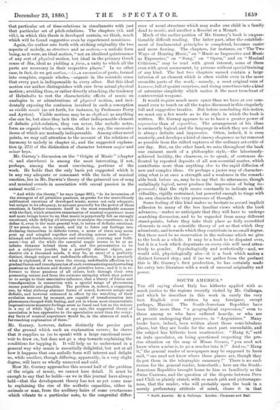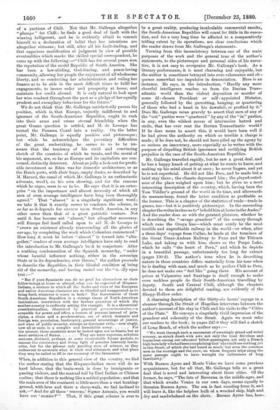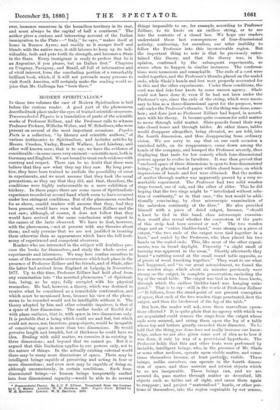SOUTH AMERICA.*
THE old saying about Italy has hitherto applied with as much justice to the regions recently visited by Mr. Gallenga, and which he describes in this work in surely the very best English ever written by any foreigner, except perhaps, Mazzini. The South-American Republics have been little more than "a geographical expression," even to those among us who have suffered heavily, or who are at present undergoing that process, in "Argentines." Many books have, indeed, been written about those semi-fabulous places, but they are books for the most part unreadable, and the subject has hitherto been unattractive. "Hang it," said an irate speculator, on being questioned respecting the pre- cise situation on the map of Minus Geraes, "you need not know where a mine is, to go a mucker into it !" And so," Hang it," the general reader of newspapers may be supposed to have said, "one need not know where these places are, though they do put them in the telegraphic summary !" There is no such excuse for the general reader, henceforth ; here are the South- American Republics brought home to him as familiarly as the Swiss Cantons, and the question of the dispute between Peru and Chili so plainly stated, with so much pith and picturesque- ness, that the reader, who will probably open the book in a merely perfunctory attitude of mind, closes it in that • Beath America. By A. Gallenga. London: Chapman and Ran.
of a partisan of Chili. - Not that Mr. Gallenga altogether "plumps" for Chili ; he finds a good deal of fault with the winning belligerent, and he is evidently afraid to commit himself to a declaration of belief that her intentions are altogether virtuous but still, after all his fault-finding, and that sagacious modification of judgment in view of possible eventualities which marks the skilled special correspondent, he sums up with the following :—" Chili has for several years won the reputation of the model Republic of South America. She has been a law-abiding, God-fearing, and peace-loving community, allowing her people the enjoyment of all wholesome liberty, and so conducting her administration and ruling her finance as to be able in the most difficult times to fulfil her engagements, to insure order and prosperity at home, and maintain her credit abroad. It is only natural to look upon her wise conduct throughout the past as a pledge of her equally prudent and exemplary behaviour for the future."
We do not think that Mr. Gallenga satisfactorily proves his position, which is, that Europe, unjustly indifferent to and ignorant of the South-American Republics, ought to rush into their arms and swear eternal friendship when the great Guano question is settled, and M. de Lesseps has turned the Panama Canal into a reality. On the latter point, Mr. Gallenga is equally positive and picturesque; but while he acknowledges the pecuniary difficulties of the great undertaking, he seems to us to be un- aware that the tendency of his vivid and convincing sketch of the countries of which he treats, and the moral of his argument, are, so far as Europe and its capitalists are con- cerned, distinctly deterrent. About as jolly a look-out for profit- able investment as Eden was for domestic architecture, or as the Dutch ports, with their huge, empty docks, as described by M. Havard, the canal of which Mr. Gallenga is an enthusiastic advocate, woul 1, on his own showing, and for the reasons which he urges, seem to us to be. He says that it is an enter- prise "on the importance and almost necessity of which all men of even average intelligence have long been thoroughly agreed." That " almost " is a singularly significant word ; we take it that it exactly serves to condemn the scheme, in so far as it depends for success upon South America, in any other sense than that of a great patriotic venture. Not until it has become not "almost," but altogether necessary, will Europe feel itself called upon to aid M. de Lesseps to "crown an existence already transcending all the glories of our age, by completing the work which Columbus commenced." How long it must be before " almost " is turned into "alto- gether," readers of even average intelligence have only to read the introduction to Mr. Gallenga's bo )1E to conjecture. After a scathing condemnation of the Spanish monarchy, "under whose baneful influence nothing, either in the sovereign State or in its dependencies, ever throve," the author proceeds to describe the Republics, in their blissful condition of, being rid of the monarchy, and having rooted out the "di. dly upas tree :—"
"But if pure Spaniards can do no good for themselves or- their fellow-beings at home or abroad, what can be expected of Hispano- Indians, a mixture in which all the faults and vices of the European and native American character are so blended and exaggerated as to bring forth whatever is worst in both ? The Government of those South-American Republics is a strange tissue of North-American institutions, interwoven with the lawless practices of which the mother-country is endlessly setting the example. It is a theoretical constitutionalism, illustrated by practical pronanciamientes,—a scramble for power and office, a contest of persons instead of prin- ciples, a chaos and a pandemonium, out of which domestic and foreign war, peculation, bankruptcy, general miscarriage of justice, and want of public security, emerge as dominant evils,—now singly, now all at once, in a complex and formidable array For the present, those countries must be looked upon not as States, but as mere embryos of States They are mere vaporous, nebulous meteors, destined, perhaps, at some incalculable future periods, to assume the consistency and living light of genuine heavenly lumin- aries, but for the present only puzzling men of science, as they endeavour to ascertain what is their real substance, and what place they may be called to fill in the economy of the firmament."
When, in addition to this general view of the country. we find the author stating that the Hispano-Indian races will do no hard labour, that the brain-work is done by immigrants or passing visitors, and the manual toil by East Indian or Chinese coolies; that there is nothing like a settled population ; and that the main area of the continent is little more than a vast hunting- . ground, with here and there a sheep-walk, we feel inclined to ask,—" And for all these' reasons,' Signor Antonio, you would have our 'monies P'" That, if this great _scheme is ever to
be a great reality, producing incalculable commercial results,. the South-American Republics will count for little in its execu- tion, and for a very long time be affected to a comparatively trifling extent by its operations, are clear conclusions which the reader draws from Mr. Gallenga's statements
Turningfrom this inconsistency between one of the main purposes of the work and the general tone of the author's statements, to the picturesque and personal sides of his narra-
tive, it is not easy to overpraise Mr. Gallenga's book. As a literary performance, it is most charming and enjoyable, but the author is sometimes betrayed into over-vehemence and elc- quence somewhat too impulsive in denunciation. Here is an
instance. He says, in the introduction, "Hardly any more cheerful intelligence reaches us from the Iberian Trans-- atlantic world than the violent deposition or murder of
some ill - chosen President or self - appointed Dictator, generally followed by the garrotting, hanging, or quartering of those who had a hand in his downfall, or profited by it." Does Mr. Gallenga mean gravely to assert that men of any of the "out" parties were "quartered" by any of the "in" parties,. in any, even the wildest access of internecine hatred and strife, that has ever rent the Iberian Transatlantic world ? If he does mean to assert this, it would have been well if he had given the authority on which so terrible a charge is made ; if he does not, he should not have piled up the agony by so serious an inaccuracy, more especially as he writes with the- purpose of dispelling British ignorance and rectifying British prejudice in the case of the South-American Republics.
Mr. Gallenga travelled rapidly, but he saw a great deal, and he has a happy knack of getting at what he wants to know, and making up his mind about it at once ; he never lingers, and yet he is not superficial. He did not like Peru, and he made but a brief stay there ; the climate depressed him ; the played-outed- ness of the place weighed upon him ; but he gives us a most interesting description of the country, which, having been the Tom Tiddler's ground of the world in its time, and afterwards its manure-heap, found the latter condition as profitable as the former. This is a chapter of the statistics of trade—trade in guano, too—but it is positively picturesque. In the succeeding chapter the writer invites us to "behold him at home in the Andes !' And the reader does so with the greatest pleasure, whether he is describing the "savage grandeur" of the scenery through which runs the Oroya line—which must surely be the most terrible and unprofitable railway in the world—or when, after a three days' voyage from Callao, he lands at the terminus of the Great Trans-Andean Railway to Puno and the Titicaca Lake, and taking us with him, shows us the Poopo Lake, which he calls "the heart of Peru," and, which he depicts in a beautiful passage, unfortunately too long for extract
(pages 130-2). The author's tone when he is describing nature in these countries differs materially from his tone when he is dealing with man, and much as he prefers Chili to Peru,.
he does not make one "feel like" going there. His account of prices at Valparaiso and Santiago is itself enough to make- even reckless people do their South-American travelling by deputy. South and Central Chili, although the chapters devoted to them are delightful reading, are evidently of the
Sleepy-Hollow order. _ A charming description of the thirty-six hours' voyage in a steamer through the Strait of Magellan intervenes between the author's account of his stay in Chili and his visits to the "Cities of the Plate." He conveys a singularly vivid impression of the grandeur and solemnity of the Strait. Again we must refer our readers to the book ; in pages 247-8 they will find a sketch of Long Reach, of which the author says :—
" We went through such a succession of amazingly grand and weird scenery, as struck dumb with awe not only the most frivolous and, loquacious among our educated fellow-passengers, not only a French high-born lady who had been complaining that she could see nothing jo/i: in this Strait, of rhich she had heard so much,' but even the common men in the steerage and the crew, on whom frequent trips along the same passage ought to have wrought the callousness of long familiarity."
With Buenos Ayres and Monte Video we have some previous acquaintance, but for all that, Mr. Gallenga tells us a great deal that is novel and interesting about those cities. Of the- former, he says, "The fate of Ravenna in the middle-ages, and that which awaits Venice in our own days, seems equally to threaten Buenos Ayres. The sea is fast receding from it, and. will leave it, like the helpless hulk of a wrecked ship, high and dry and sandwhelmed on the shore. Buenos Ayres has, how-
ever, immense resources in the boundless territory in its rear, and must always be the capital of half a continent" The author gives a curious and interesting account of the Italian immigration to the Plate :—" Italy," he says, "makes itself at home in Buenos Ayres; and readily as it merges itself and blends with the native race, it still labours to keep up its indi- viduality, feels and puts forth its strength, and becomes a State in the State. Every immigrant is ready to profess that he is an Argentine, if you please, but an Italian first." Chapters on Uruguay, Paraguay, and Brazil, all full of information and of vivid interest, form the concluding portion of a remarkably brilliant book, which, if it will not persuade many persons to visit South America, will certainly make the reading world re- joice that Mr. Gallenga has "been there."




































 Previous page
Previous page